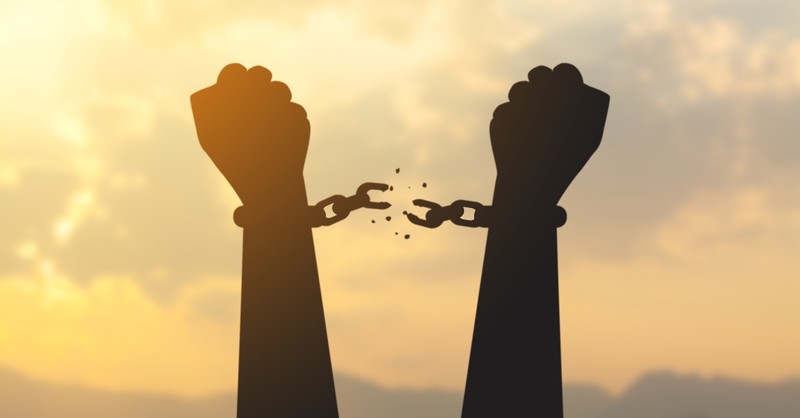
Joy isn’t a constant state. We know that, right? It’s more like a current. A flow. And sometimes the riverbed runs dry not because of some grand catastrophe, but because of a thousand tiny, thoughtless leaks.
I need you to understand that the real fight for your peace isn’t out there in the endless noise of the world but backstage in the quiet of your own mind. But what if your joy isn’t gone, just…misplaced, or handed over to the same five thoughts that haunt the rest of us?
Photo credit: ©GettyImages/Bulat Silvia

1. “My Portion is Smaller Than Theirs”
Most of the time, it starts with a glance. A sidelong look at a neighbor’s new car, a friend’s seemingly effortless marriage, a colleague’s rapid ascent. As humans, we love to measure our behind-the-scenes against their highlight reel, and the math always leaves us in the red. This isn’t just envy. It’s a deeper, quieter thing—a fundamental questioning of the distribution of grace. It’s the bitter whisper that the universe, or God, has been less generous with you.
You start tallying your life like a ledger, and the columns never balance. Their health, your ailments. Their abundance, your lack. Their peace, your chaos. The focus shifts from what’s in your hand to what’s not. And a hand clenched tight around perceived lack can’t receive a thing. Can’t hold the simple, good things already there.
It hits me how old Asaph, the psalmist, walked this exact ground. He saw the prosperity of the wicked and his feet nearly slipped. He felt plagued, punished, every single morning. It wasn’t until he entered the sanctuary—into a different kind of quiet—that he perceived their end. His perspective did a hard pivot from horizontal to vertical.
Asaph stopped comparing his portion to the man beside him and remembered the One who held it. Psalm 73:24-26, “Thou shalt guide me with thy counsel,” he writes, that raw honesty just…pouring out. “and afterward receive me to glory. Whom have I in heaven but thee? and there is none upon earth that I desire beside thee. My flesh and my heart faileth: but God is the strength of my heart and my portion forever.”
You see, he said, “My portion,” not theirs. Mine. The unique allotment of grace and grit is designed for my soul’s curriculum. So, when we believe our portion is smaller, we’re starving ourselves at a feast we’ve refused to see.
Photo credit: ©Getty Images/franckreporter

2. “This Burden is Mine Alone to Carry”
This is the thought that isolates. It finds you in the still, heavy night hours or in the middle of a crowded room where you feel utterly invisible. It’s the conviction that your struggle, your secret anxiety, is a solitary cross you must bear in silence. To share it would be to burden others. To reveal the weakness. To break the facade.
So you cinch the weight tighter on your shoulders. You walk with a spine so straight it aches from the strain of pretending it doesn’t. You become the strong and reliable, feeling a quiet fracture spreading within.
But come on. Let’s be real. No one makes it alone. We’re just…not built for it. The writer of Ecclesiastes, with all that weary, profound wisdom, states it plain as day in Ecclesiastes 4:9-10: “Two are better than one because they have a good reward for their labor. For if they fall, the one will lift up his fellow, but woe to him that is alone when he falleth, for he hath not another to help him up.”
This isn’t just practical advice. It’s a spiritual truth. The enemy of joy loves isolation. He whispers that you’re alone in this, that no one would get it. The act of vulnerability—of letting one trusted soul see the load—is an act of defiance against that lie. It halves the sorrow. Doubles the joy—every single time.
Photo Credit: ©iStock/Getty Images Plus/Jirapong Manustrong

3. “If I Rest, I Am Falling Behind”
The cult of productivity is a cruel master. Its gospel is endless hustle, optimized mornings, side-hustles, and late nights. It equates your worth with your output. And so, rest becomes not a sacred necessity but a moral failure. The thought that to pause is to fall behind. To lose ground.
So you grind. You burn the candle at both ends until the wax pools into a numb exhaustion. You feel a low-grade anxiety humming in your veins, a constant background noise of not enough. Joy can’t live here. Joy needs space to breathe. To expand. To be noticed.
We’ve forgotten the ancient rhythm—the one woven into the fabric of…everything. After a whole symphony of “and it was good,” the Creator of the universe just…rested. Not because He was tired, but to sanctify the pause, to set a pattern. He called it holy.
The Bible clearly says in Genesis 2:2-3, “And on the seventh day God ended his work which he had made; and he rested on the seventh day from all his work which he had made. And God blessed the seventh day and sanctified it: because that in it he had rested from all his work which God created and made.”
The world tells you to define yourself by what you do. The text invites you to remember that your identity defines you. A human being. Not a human doing. Blessed. Sanctified. In the rest itself. Slowing down isn’t falling behind. It’s remembering your name.
Photo Credit: ©Getty Images/skynesher

4. “My Past is The Final Word”
This thought is a ghost. It haunts the present. It drags the failures, shameful moments, and heartbreaks of yesterday into the fresh air of today and uses them to poison the well. It tells you that you are the sum of your worst decisions, that your history is your destiny, and that grace is for other people but not for you because you know what you’ve done.
It’s a life sentence you hand down to yourself. Every. Single. Day.
But what if the story isn’t over? What if the past is a chapter, not the entire book? The promise isn’t one of amnesia, but of redemption. Beauty for ashes. New beginnings that don’t require denying the past but aren’t bound by it.
This is the radical, liberating hope that Paul, a man with a past filled with violence, clung to in Philippians 3:13-14: “Brethren, I count not myself to have apprehended: but this one thing I do, forgetting those things which are behind, and reaching forth unto those things which are before, I press toward the mark for the prize of the high calling of God in Christ Jesus.”
Forgetting here isn’t about erasing memory. It’s about breaking its power to define you. It’s unshackling your identity from your failure and reaching forth. The past is a fact. But it is not the final word. The final word is grace. And grace…grace always gets the last say.
Photo credit: ©Getty Images/manopjk

5. “I Must Be in Control”
This is the mother of all anxiety. There is a need to manage, manipulate, and maneuver every outcome. To play chess with a universe that often feels like it’s playing dice. We clench our fists, trying to hold the water of our lives tight, only to feel it all slip through our fingers. The fear of what might happen becomes a prison, stealing the joy of what is happening.
We think control will bring peace. It only brings exhaustion.
There’s a profound freedom in admitting a simple truth: you are not the general manager of the universe. Your job isn’t to control the wind, but to set the sail. It’s to show up. To be faithful in the small things. To trust there’s a current of purpose running deeper than your temporary panic.
The words of Jesus cut straight to the heart of this frantic energy: “Which of you by taking thought can add one cubit unto his stature?” (Matthew 6:27). It’s a question that begs a humble, quiet answer—none of us. None of us can change a single thing by worrying. He points to the lilies and the birds—beings of utter dependence who are clothed in a glory that rivals kings. They don’t strive. They simply are. They receive.
This isn’t a call to passivity. It’s a call to a shift in focus. From controlling outcomes to engaging with presence. From fearing tomorrow to receiving today. It’s the exchange of a crushing burden for a light yoke.
Conclusion
Your joy wasn’t lost or stolen, to begin with. It was just waiting for you to stop looking elsewhere. To stop comparing. To stop carrying. To stop striving. To stop condemning. To stop controlling.
It was waiting for you to acknowledge the quiet thoughts that shout so loudly and, in acknowledging them, to loosen their grip.
The battle isn’t out there. It’s in here in the sacred space between your ears. And it’s not a battle to be fought with brute force, but with a gentle, relentless redirection. A return. A remembering.
Photo credit: ©GettyImages/fcscafeine
Originally published Tuesday, 16 September 2025.





